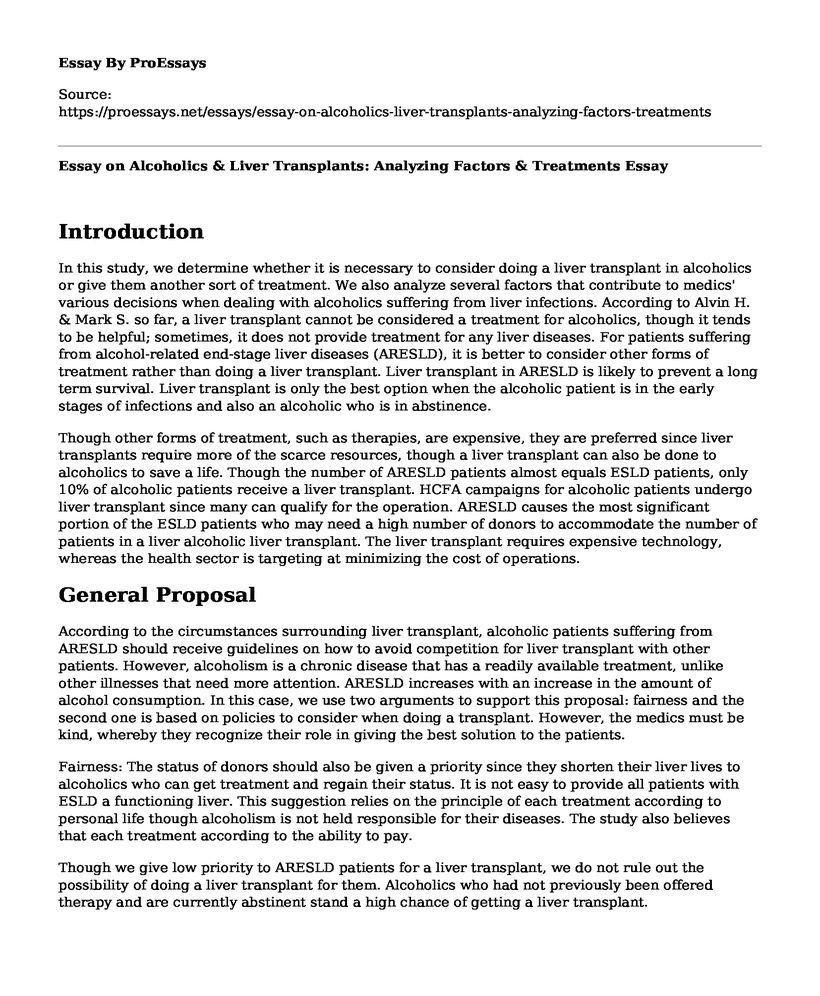Introduction
In this study, we determine whether it is necessary to consider doing a liver transplant in alcoholics or give them another sort of treatment. We also analyze several factors that contribute to medics' various decisions when dealing with alcoholics suffering from liver infections. According to Alvin H. & Mark S. so far, a liver transplant cannot be considered a treatment for alcoholics, though it tends to be helpful; sometimes, it does not provide treatment for any liver diseases. For patients suffering from alcohol-related end-stage liver diseases (ARESLD), it is better to consider other forms of treatment rather than doing a liver transplant. Liver transplant in ARESLD is likely to prevent a long term survival. Liver transplant is only the best option when the alcoholic patient is in the early stages of infections and also an alcoholic who is in abstinence.
Though other forms of treatment, such as therapies, are expensive, they are preferred since liver transplants require more of the scarce resources, though a liver transplant can also be done to alcoholics to save a life. Though the number of ARESLD patients almost equals ESLD patients, only 10% of alcoholic patients receive a liver transplant. HCFA campaigns for alcoholic patients undergo liver transplant since many can qualify for the operation. ARESLD causes the most significant portion of the ESLD patients who may need a high number of donors to accommodate the number of patients in a liver alcoholic liver transplant. The liver transplant requires expensive technology, whereas the health sector is targeting at minimizing the cost of operations.
General Proposal
According to the circumstances surrounding liver transplant, alcoholic patients suffering from ARESLD should receive guidelines on how to avoid competition for liver transplant with other patients. However, alcoholism is a chronic disease that has a readily available treatment, unlike other illnesses that need more attention. ARESLD increases with an increase in the amount of alcohol consumption. In this case, we use two arguments to support this proposal: fairness and the second one is based on policies to consider when doing a transplant. However, the medics must be kind, whereby they recognize their role in giving the best solution to the patients.
Fairness: The status of donors should also be given a priority since they shorten their liver lives to alcoholics who can get treatment and regain their status. It is not easy to provide all patients with ESLD a functioning liver. This suggestion relies on the principle of each treatment according to personal life though alcoholism is not held responsible for their diseases. The study also believes that each treatment according to the ability to pay.
Though we give low priority to ARESLD patients for a liver transplant, we do not rule out the possibility of doing a liver transplant for them. Alcoholics who had not previously been offered therapy and are currently abstinent stand a high chance of getting a liver transplant.
Objection to Proposal
Though medics may prefer other patients for liver transplant over alcoholics with AR ESLD due to insufficient donors with treatment services, the medics should also try to be non-maleficence to liver donors who risk their lives. The stand of medics against liver transplant meets an argument since some argue that all patients should receive fair treatment, which also included a liver transplant.
References
Moss, A.H., Siegler, M. (2016). Should alcoholics compete equally for liver transplantation. John Wiley & Sons.
Wasylenko, E. Pandemic ethics and allocating scarce resources. https://drive.google.com/file/d/18tfvwR4d_aDRgRB6oUC2fQGqtEUHFeXy/view?usp=sharing
Cite this page
Essay on Alcoholics & Liver Transplants: Analyzing Factors & Treatments. (2023, Aug 16). Retrieved from https://proessays.net/essays/essay-on-alcoholics-liver-transplants-analyzing-factors-treatments
If you are the original author of this essay and no longer wish to have it published on the ProEssays website, please click below to request its removal:
- Following Routine Essay
- How to Better Treat the Patients With Dementia? - Research Proposal
- Public Health Critical and Reflective Essay
- How Lack of Knowledge by Nurses Dealing With Dementia Patients Creates a Stressful Working Environment
- Research Paper on Type I Diabetes: Autoimmune Illness Affecting All Ages
- Essay on School Improvement: Drafting a Strategy for Better Outcomes
- Paper Example on Definition of Meaningful Use of HIT







